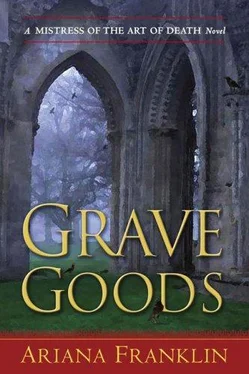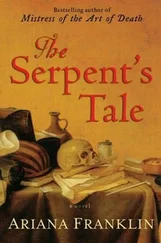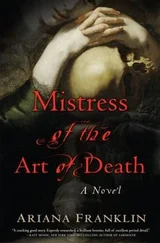It had been Caradoc’s joy that he could serve God in the place where Arthur had been brought to be mended from his wounds after the last great battle.
Was he dead, then? Was great Arthur dead?
The earth trembled again, lightly, like a dog settling itself to sleep. Caradoc heard other voices, this time calling his name. An arm went under his head, and he looked up into the frightened eyes of his nephew.
“Look, bach,” Caradoc said, trying to point. “They are burying King Arthur. Three of his lords in hooded cloaks, see.”
“Lie still now, Uncle,” Rhys said, and shouted up the hill to the other searching monks, “I’ve found him. Here, he’s by here.”
“There, boy,” Caradoc said. “Between the pyramids, in the fissure. I saw them lower his coffin; I heard them mourning him.”
“A vision, was it?” Rhys asked, peering toward the graveyard and seeing nothing.
“A vision, clear as clear,” Caradoc said. “There’s sad it is that Arthur is dead.”
“Whisht now, Uncle,” Rhys said. “There’s help on the way.” To calm and comfort the old man, he began singing, not a hymn but a song that Welsh mothers sang to their children-a song of Arthur Pendragon.
“… when the land rang with minstrels’ song the sharpening of weapons,the splash of oars coming into harbor, a ripple of water in the sea-cave… ”
Caradoc’s eyes closed, and he smiled. “Good, good,” he whispered. “At least I shall lie where King Arthur lies. There’s company.”
When the other monks came upon him, they found Rhys still singing as he cradled a dead man.
They buried Brother Caradoc the next morning. If there had ever been a fissure in the graveyard, the earthquake’s last tremor had filled it in, for there was no sign of it.
Nor did Rhys ap Griffudd tell anybody of what his uncle had seen. Rhys, who was not suited to be a monk and knew now that he never would be, was a Welshman through and through, and it would not do for these English to know that Arthur was dead.
So for twenty-four years the two pyramids guarded the place where an old monk had seen Arthur buried, and nobody knew the importance of what lay between them.
Until…
…
MARCH, A.D. 1176, and a wind hurtling down a ravine in Wales, blowing the haulms of reeds and the flare of torches in the same streaming angle as the hair on the severed heads that topped the line of poles leading up to the Plantagenet tents. It sent grass, leaves, and branches nodding in vehement agreement.
With a spike through their Welsh brains, the heads couldn’t nod, though they revolved slightly so that their blank eyes shifted, as if dividing their attention between the bottom of the ravine, where English soldiers were digging burial pits, and a limping mailed figure who was dragging a woman up the steep slope toward the tents.
As she was pulled level with the poles, the woman broke into a wail of Welsh lamentation, peering at each head and calling out what, presumably, were their names.
The mailed man paused, puffing-she was a big lady to haul. “Look,” he said, “they were killed in battle. Battle. Understand? My lads got a bit carried away with their bodies, that’s all. The king doesn’t behead prisoners, at least not often-he’s a good king. Good.”
But the woman was ignorant of English, no matter how loudly it was emphasized. “Duw, Duw,” she cried, lifting her arms to the sky. The man had to get behind her and push before she’d go farther.
The opening of the bigger tent was lit from inside, outlining the figure of Henry II, who stood at its entrance, also mailed, also shouting-this time at a line of bound men being made to kneel in front of him-while a man-at-arms undid the king’s hauberk at the back and carefully peeled it off.
“There was no point to this, you stupid bastards. No point.” To the interpreter at his side, the king said, “Tell ’ em that. Tell them I’ve made peace with their lord Deheubarth, or however the bugger pronounces it. They won’t have to pay any more taxes with me as their king than they pay him already.” He paused. “Well, not much more.” He pressed a cloth against his left arm to stop the bleeding. “Now look what they’ve done. Tell them I’ve had to mount an expensive campaign to put down their bloody rebellion, I’ve lost good men, they’ve lost good men, I won’t be able to use my shield arm for bloody days, and they’ll be taxed for it until their brains squeak-that’s if they’ve got any and if I don’t gouge them out. Tell ’ em that. Tell them Arthur is dead.”
At the sound of the name, the kneeling prisoners raised their heads as one man and a shout of “Bywyd hir Arthur” rippled along the line.
“Arthur live forever,” translated the interpreter, helpfully.
Henry Plantagenet exhaled with violence. “I know what it means.” He extended his wounded arm. “The bastard who did this was shouting it. They all shout it. Tell them Arthur is dead. I’m as proud of him as the next man, but he lived about seven hundred years ago and… There you are, Bishop, and who in hell is this?”
The lady from the hill had arrived in the tent with her companion.
Rowley, bishop of Saint Albans, lifted off his helmet, then the coif beneath, and rubbed his nose where the nasal had chafed it. “I believe she’s from the village down the valley, my lord. She was wandering among the dead-looking for her son, I think.”
“It seems she’s found him,” Henry said-the woman had cried out and thrown herself at one of the prisoners, toppling him over in her joy. “Yes, that’s his mother, all right…” For now the woman had taken to slapping the prisoner around his head with some force. “You usually like ’em slimmer and younger.”
Saint Albans ignored the slur. “My lord, one of our men down there, he speaks a bit of Welsh, he seems to think she’s got something valid to tell us and wants to ransom her son with it.”
“What in hell can she possibly… oh, all right. Fulk, take the others away, all except that one and the lady. And send up that pill-pissing butcher who calls himself a doctor.”
Fulk signaled to two of his men, who began kicking the prisoners to their feet. “Do you want me to hang them, my lord?”
“No, Fulk, I don’t,” Henry told him wearily. “I want to enlist them. I want them to teach my bloody archers a thing or two, and they can’t do that with their necks stretched.”
As the prisoners were taken away, the king turned to Rowley and gestured to an unusually long bow propped in a corner. “How do they do it? I tried and I could hardly bend that damn thing, but those wizened little bastards pull it back as easily as a pump handle.”
“It’s a skill we’ve got to learn, no doubt about that,” Rowley said. He set about taking off his chausses.
“And the penetration… one flight just missed me and hit a tree. I pulled it out later. Nine inches in, it was. I swear, nine inches into solid oak. If it hadn’t been for the wind…”
“That’s what saved me; the wind swerved mine and took off most of its force.” The bishop looked morosely at the calf of his leg. “Still went in, though, and, damnation, it’s taken a couple of links in with it.”
“That’ll need cauterizing, then,” the king said, cheering up. “And now, Owain, my boy, what are those two yammering about?”
The interpreter, an elderly border Welshman with the gift of making himself near invisible, had been attending to the conversation of mother and son in the tent entrance, most of it pursued by the woman. “Interesting, my lord. Urging him to tell you about Arthur, so she is. Something about Glastonbury and a vision…”
“Arthur?” The king, who’d collapsed onto a stool, sat up.
Читать дальше












